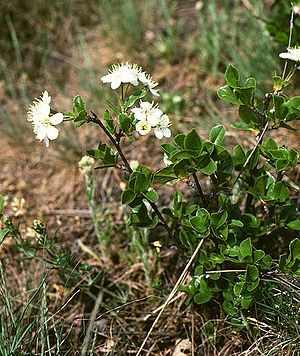Note: This is a project under development. The articles on this wiki are just being initiated and broadly incomplete. You can Help creating new pages.
Difference between revisions of "Prunus fruticosa - Mongolian cherry"
Chaithrika (talk | contribs) m (Chaithrika moved page Mongolian cherry to Prunus fruticosa: renaming as per convention) |
Chaithrika (talk | contribs) (+Common names) |
||
| Line 16: | Line 16: | ||
*A green dye can be obtained from the leaves<ref name="uses2"/> | *A green dye can be obtained from the leaves<ref name="uses2"/> | ||
*In small amounts this exceedingly poisonous compound stimulates respiration, improves digestion and gives a sense of well-being<ref name="uses2"/> | *In small amounts this exceedingly poisonous compound stimulates respiration, improves digestion and gives a sense of well-being<ref name="uses2"/> | ||
| + | |||
| + | ==Common name== | ||
| + | |||
| + | * '''English''' - Mongolian cherry | ||
== References == | == References == | ||
Revision as of 16:40, 4 March 2017
Prunus fruticosa, the European dwarf cherry,[1] or dwarf cherry, Mongolian cherry or steppe cherry is a deciduous, xerophytic, winter-hardy, cherry-bearing shrub. It is also called ground cherry and European ground cherry, but is not to be confused with plants in the distinct "Groundcherry" genus of Physalis.
Description
As a shrub Prunus fruticosa grows 1–2 metres (3.3–6.6 ft) high and as wide, in almost any soil, but best in loamy soil, spreading via suckers. Roots are abundant. The plant requires full sun, it is a steppe rather than a forest plant, although it does form thickets at the edges of open forest.
The bark is dark brown with yellow lenticels. The leaves are oblanceolate to obovate, about 12 mm by 6 mm, with acumenate apex, glabrous above, thick, serrated with crenate margin, dark green, yellow in autumn, with a short petiole.
The flowers are white hermaphroditic blossoms in leafy bracts located 2-4 each on short peduncles in sessile umbels. They are pollinated by bees. In the Northern Hemisphere, the plant flowers in May. The fruit is light to dark red, globose to pyriform, about 8–25 mm in diameter, ripening in August. The taste is sour-sweet, or tart.
Uses
- As a sour tasting cherry, the fruit is used in cooking, and for jams and jellies. It has medicinal uses as an astringent.[2] The flowers are its basis of bee-keeping honey plant.
- A green dye can be obtained from the leaves[3]
- In small amounts this exceedingly poisonous compound stimulates respiration, improves digestion and gives a sense of well-being[3]
Common name
- English - Mongolian cherry
